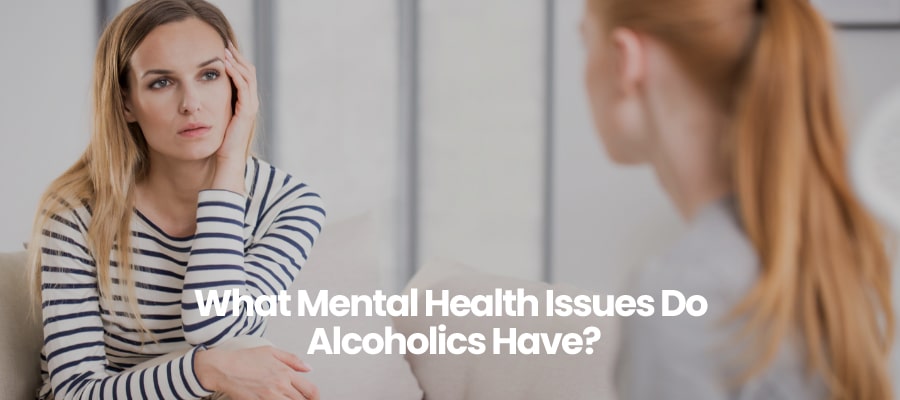Table of Contents
ToggleMental Health Issues Related to Alcoholism
Although alcohol is considered socially acceptable to consume in most parts of the world and is heavily advertised on television and the streets, heavy alcohol use can prove to be deadly to a person’s physical and mental wellbeing and the overall physiological health of their brain. In addition, heavy or long-term alcohol use can result in learning and memory issues and eventually lead to developing or worsening mental health conditions.
According to the 2019 National Survey on Drug Use and Health (NSDUH):
85.6 percent of people ages 18 and older reported that they drank alcohol at some point in their lifetime, 69.5 percent reported that they drank in the past year, and 54.9 percent (59.1 percent of men in this age group and 51.0 percent of women in this age group) reported that they drank in the past month.
The Effects Of Alcohol And Your Mental Health
Most of us know the short-term issues and consequences of alcohol: hangover, vomiting, blackouts, maybe a heated argument that would not usually happen if sober, and maybe even a DUI. Of course, all of these and more can happen if we drink to the point of intoxication on occasion, but the long-term effects are much more dangerous.
The brain is a very delicate and intricate organ of the body that must maintain a careful balance of chemicals, called neurotransmitters, to function properly. Intoxication of alcohol can disrupt this fine balance, disturbing the brain’s natural equilibrium. In addition, when used long-term, over long periods, it forces a person’s brain to adapt to compensate for the effects of alcohol. According to the National Institutes of Health (NIH):
Three mental disorders most commonly comorbid with alcoholism are major depression, bipolar disorder, and anxiety disorder. Less frequently co-diagnosed with alcoholism are post-traumatic stress disorder (PTSD), dependent personality disorder, and conduct disorder.
Alcohol And Depression Disorder
It seems not to make sense to abuse alcohol when you feel depressed since alcohol is a nervous system depressant. Dopamine that floods the brain when you drink is linked to feelings of euphoria, pleasure, and improved mood. When a depressed person drinks alcohol, they feel temporary relief from depression and sadness. However, after the drunkenness wears off, their depression comes roaring back. In addition, when one is addicted to alcohol and stops drinking, the person experiences withdrawal symptoms, such as worsening depression, anxiety, and flu-like body pain.
The Effects Of Alcohol And Bipolar Disorder
Bipolar disorder makes people cycle through “low” moods and “high” moods. Bipolar disorders are much more severe than depression or anxiety. The manic phase of bipolar disorder makes people feel incredibly anxious and agitated. They can’t slow down racing thoughts or control impulsive behavior that often creates difficulties in relationships and finances. Consequently, alcohol abuse is often seen in people with bipolar disorder as their way of dealing with their issues.
Alcohol Use and Anxiety
In addition to increasing dopamine in the brain, alcohol also fuels endorphin release. Like dopamine, they boost feelings of pleasure and well-being. Endorphins also help reduce pain caused by physical injuries. People with generalized anxiety disorders or panic disorders often self-medicate with alcohol to suppress symptoms and temporarily feel like they control their anxiety. In many cases, individuals taking prescription anti-anxiety medications use alcohol to increase the side effects of Valium or Xanax. This increases the risk of accidental overdose as well as an addiction to pills and alcohol.
Take Back Your Life With Dual Diagnosis Treatment at AGAPE
Dual diagnosis or Co-Curring Disorder is when someone experiences a mental illness and a substance abuse problem simultaneously. At Agape Treatment Center, we know that these poor outcomes result from these separate and contradictory systems of care as from the diagnoses themselves.
Experience the difference with Agape Treatment Center of South Florida: A Behavioral Healthcare Program focused on a twelve-step rehabilitation program created solely to save lives from the grip of chemical dependency, substance abuse, mental health disorders, co-occurring disorders, and alcoholism.

Stephanie Catalano is an accomplished Clinical Director at Agape Behavioral Healthcare. With a Master of Social Work degree, LCSW license, and extensive training in Rapid Resolution Therapy under her belt, she brings a wealth of expertise to her role. Her unique combination of education and experience allows her to provide exceptional care to clients and lead her team with confidence. Stephanie’s joy comes from witnessing the moments when her patients creatively connect the dots and bravely move toward reclaiming their power. Her purpose is to help individuals understand their past so they can create a future full of hope, growth, and success. Stephanie attributes a large portion of her success to the supportive culture and strong sense of community fostered by the Agape team.







